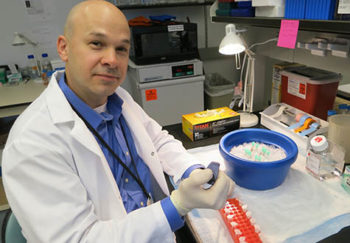
Obamacare and Its Impact on Cancer Screening
The Bite-Sized Synopsis: Researchers published a study in the journal Health Affairs, which found that the Affordable Care Act (ACA, also known as Obamacare) resulted in an 8 percent increase in the diagnosis of early stage colorectal cancer among U.S. seniors.
What This Could Mean for You: The authors of the study stress that the study is not politically motivated, but that preventable care “is important and we need to promote that,” says Nengliang “Aaron” Yao, PhD, of the UVA School of Medicine’s Department of Public Health Sciences,
Read more about the ACA’s impact on cancer screening.
Study: Fewer Opioids, Improved Pain Scores
The Bite-Sized Synopsis: A study of more than 100,000 UVA surgical cases found patients’ pain scores improved even as doctors gave fewer opioids. Between March 2011 and November 2015, the average amount of opioids given per surgery declined 37 percent. At the same time, surgical patients’ self-rated pain scores improved by 31 percent.
What This Could Mean for You: The use of non-opioid pain medications is on the rise, as are programs like the Enhanced Recovery After Surgery program, which includes limiting opioids for colorectal surgery patients. Research has shown that opioids make patients more sensitive to pain, so just reducing the amount of opioids given to patients may improve pain scores.
Read more about the UVA anesthesiologists and their findings in this study.
New Treatment for Dry Eye
The Bite-Sized Synopsis: UVA researchers have developed a potential therapeutic treatment for dry eye that aims to treat the cause rather than mask symptoms. The drug, Lacripep, could eliminate inflammatory triggers rather than suppress already-existing inflammation.
What This Could Mean for You: The first trial will accept only patients with Sjögren’s syndrome dry eye. Dry eye is a common problem. Although the research continues, this could could ultimately mean a better treatment for them. Gordon Laurie, PhD, of the School of Medicine’s Department of Cell Biology explains: “Most ophthalmic drugs are washed away right away, but that’s not the case here. Lacripep is still in the tears 24 hours later, because it goes into the lipid layer and apparently comes out of the lipid layer slowly to treat the eye.”
Read more about Lacripep and the research behind its development.
House Calls: Nurse Practitioners Fill the Need
The Bite-Sized Synopsis: Frail and elderly patients increasingly rely on nurse practitioners to provide house calls. Since 2013, they’ve provided more than 1.13 million home visits, more than internal medicine doctors.
What This Could Mean for You: The number of new doctors licensed each year is capped by the number of medical residencies available, but there is no such limit on nurse practitioners. But regulations in many states are limiting the growth of that field as well, says researcher Nengliang “Aaron” Yao, PhD, of the School of Medicine’s Department of Public Health Sciences. By revisiting those rules, he said, state governments could help address some of their residents’ unmet medical needs.
Read more about Yao’s research into providing care for the geriatric population.
Increased Federal Research Funding at The School of Medicine
The Bite-Sized Synopsis: A report from Blue Ridge Institute for Medical Research shows that federal funding for UVA’s medical research surged to more than $126 million in 2016. In one year, UVA climbed from 40th in NIH support to 35th. In an extremely competitive environment, this is remarkable.
What This Could Mean for You: Increased funding means research that patients can benefit from. “This is a clear testimony to the excellence of our faculty researchers and the quality of their work,” says David S. Wilkes, MD, dean of the School of Medicine.
Read more about the study’s findings.

